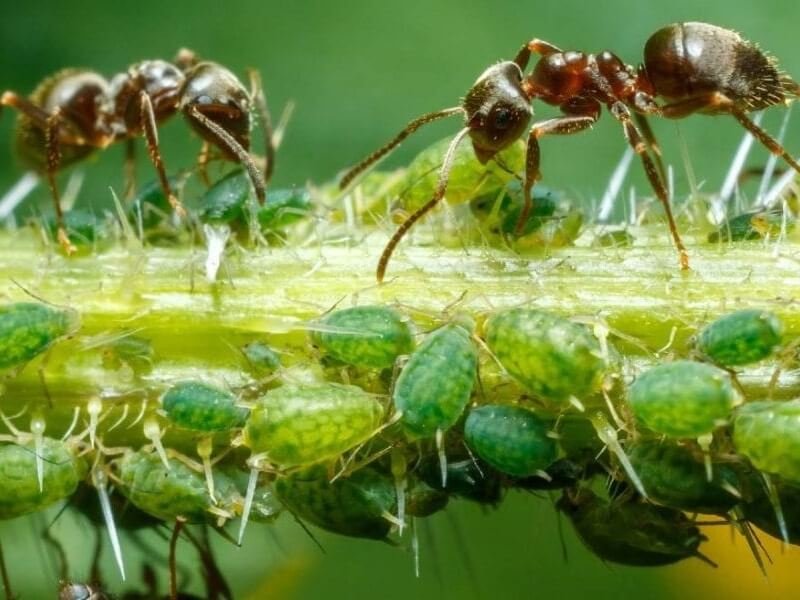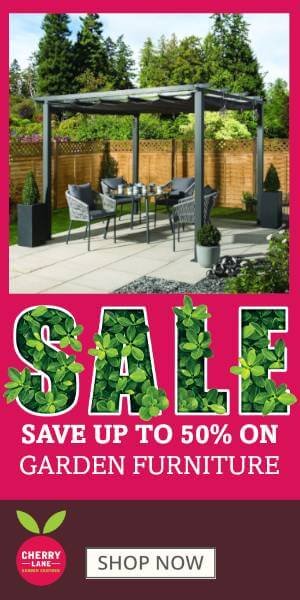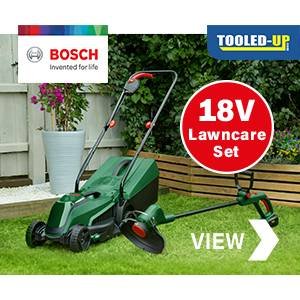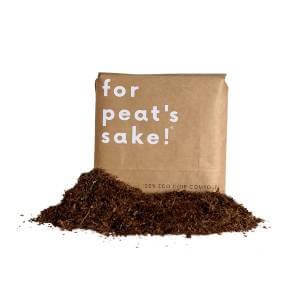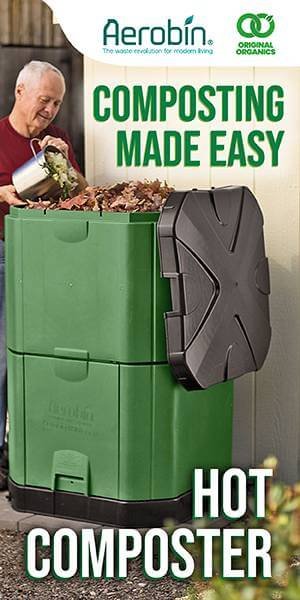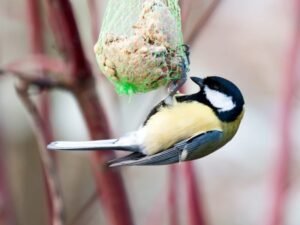In one colony, there could be thousands of ants inside, which can sometimes make it harder to control them. Not to fear, we are here to give you some excellent preventatives and tips for getting rid of them this summer!
Despite this, though ants can be beneficial – they have a significant impact on the ecosystem and are a major predator of small invertebrates.
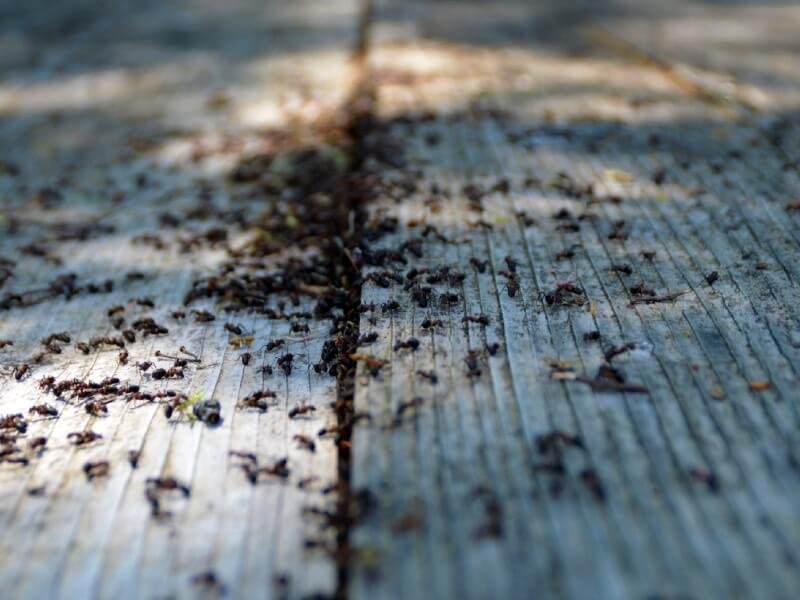
How to spot if you have ants?
It is hard to pinpoint what exact symptoms to look out for when ants have attacked your plants; typically, you will notice the ants first – mainly if they are inside your home.
- You may notice ants on the plant’s stem; this results from a plant infested with insects that excrete honeydew, in which the ants can be seen to collect and protect the insects producing this.
- In regards to identify ants, there are more than 12,000 species of ants; more than 30 of these can be found in the UK; the identification of every single one would be tricky for anyone, so we’ve narrowed it down to the top three most common ones you will find in your garden:
Why have I got ants?
Anyone can get ants; it’s natural. They are attracted to anything damp, contains standing water, or anything that smells sweet or sugary. It’s unlikely that you will completely stop ants from getting into your home or garden.
Most common Ant species to find in your home and garden
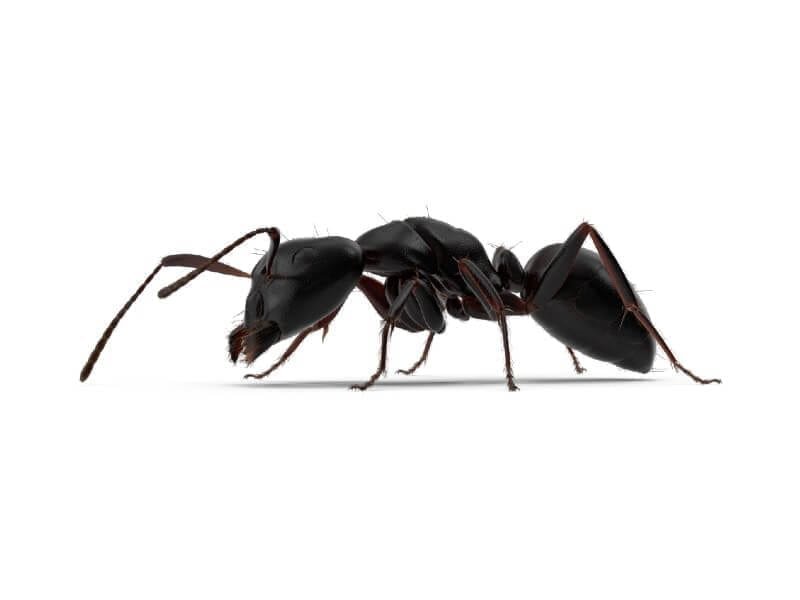
Black Ants
Common name: Black ants
Scientific name: Lasius niger
Black ants are probably the most common to see inside your house and also in the garden. Although harmless, they will pretty much nest anywhere they can and are attracted to sugary substances.
It will take 8-9 weeks for an egg to develop into a black ant. All black ants’ bodies are the same, two antennas, six legs, and their body can be brown down into – their head, the thorax and at the end, their abdomen.
Ants are most common during the summer and in particular over the months of April-October. What is most interesting is the sizing of them is dependent on their role in the colony –
A worker will be roughly around 2-5 mm in length; they are a black/dark brown colour. These ants will live for 1-2 years! The queen is much longer at 7-10mm, again a brown shaded, black colour with transparent wings. Although uncommon, a queen can live up to 30 years.
The male ants have wings and lengthwise are 3.5-5.0mm and are the same colour. Unfortunately, the males in the colonies are there to mate with the queen and die shortly after doing so.
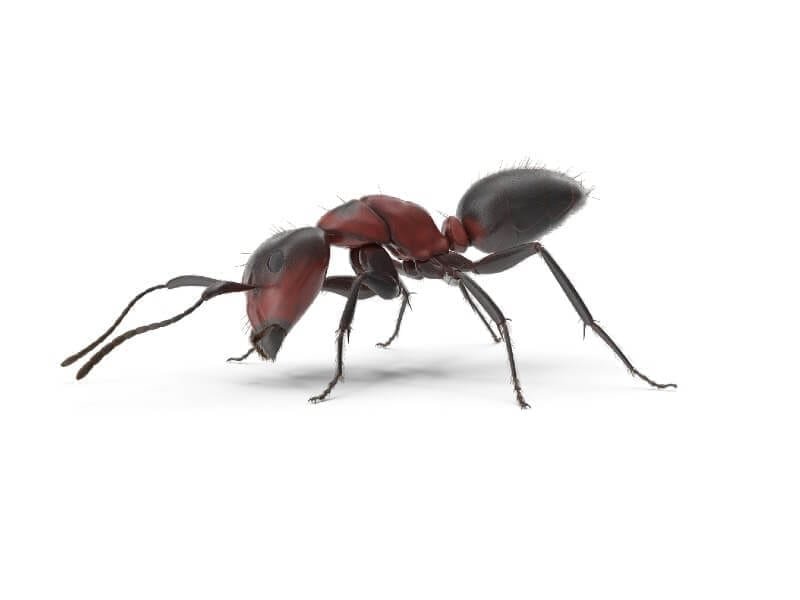
Red Ants
Common name: Red ants or Fire Ant
Scientific name: Myrmica Rubra
The red ant, in contrast, can give you a painful sting but can be easily identified by its deep red colour. Like the black ant, they are attracted to sugar but live in much smaller nests.
Their length is between 4-6mm and can be found anytime from January-December. It’s unlikely they will come into your house and are often found under stones, logs, and soil in lawns.
During late summer, in hot, humid weather, winged adults will swarm, mate and eventually disperse into new colonies – these are the ‘flying ants”.
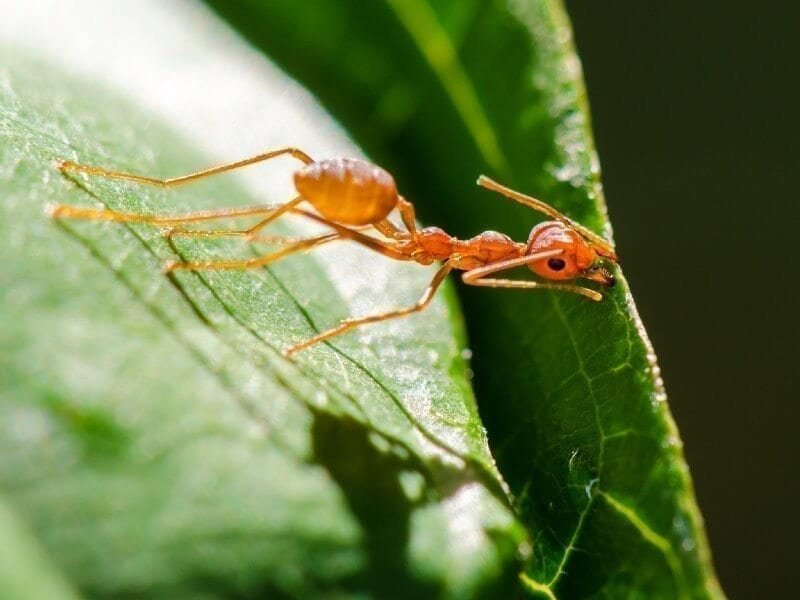
Yellow meadow ants
Common name: Yellow meadow ants
Scientific name: Lasius Flavus
These are a dark brown/orange colour and around 2-5mm in length. Completely harmless ants, the yellow meadow ants are very small and rarely ever seen on the surface (unless you disturb their nest).
Hiding away under grass mounds, they forage beneath the soil, feeding on small insects; these are more difficult to tempt with bait. They are known to leave small earth mounds on your lawn and flowers beds and farm aphids on plants’ roots. However, they are not harmful to people or plants.
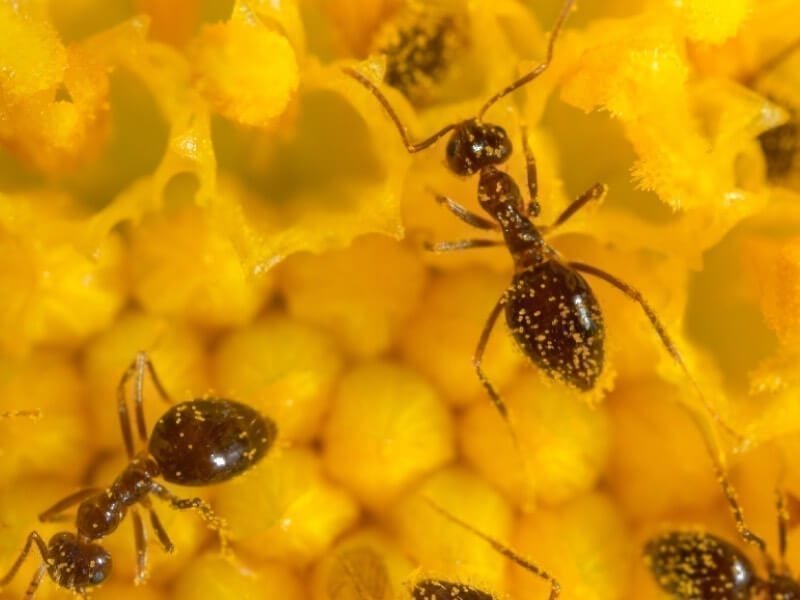
How to get rid of Ants?
If you notice ants in your garden, we would suggest tolerating them when and where possible; the same can also be said if found in a compost heap or bin.
Inside the home, however, there’s a lot of tricks to get rid of ants specific for the different types of species and before the use of chemicals. It has been suggested that baits work better than chemicals.
Despite how fast-acting insecticides are, they only affect the top ants on the surface, so we would suggest not just using these individually but a combination of methods.
Find nest entrances
A good trick is to find the nest entrances, these will be small piles of earth pellets, or equally, you can spot by watching the ants move back and forth from the nest to food. Once you locate the nest, pour a kettle of boiling water over the site.
Use essential Oils
Essential oils are great to repel ants; peppermint, tea tree, and lemons are all examples of non-chemical methods that can be used.
Use White vinegar
Another method is to make your own solution – 50% water and 50% white vinegar. White vinegar not only kills ants but also repels them. Some websites even go as far as to say to clean the countertops and floors with vinegar; however, we wouldn’t recommend this!
Use sugar-based baits
Sugar-based liquid baits are another option; these will cause the workers to destroy their own nest. As the workers carry the insecticides back to the larvae and the queen, the colony will slowly die.
However, during this time, you may see an increased number of ants due to the sweet treats left out! Combined with this, it’s also good to note that ants can change their preferences; for example, smaller tropical Pharaoh’s ants prefer protein to sweet food.
Therefore, a good trick is to leave several types of toxic baits out and keep replacing them. Baits are great for Black ants! We would use Amdro Liquid Ant Bait Stations (although always be wary around pets and children, always read the label)!
Use Ant powder
Ant powder is a great option to use; although slightly unsightly, it is worth it! They can help guard re-infestations for up to 12 weeks, and they will start dying within 30 minutes!
Use Fire Ant killer
If you have red ants outdoors, we would suggest “Fire Ant Killer”, working within three days its simple and low maintenance for you! Always read the label! Be mindful not to disturb the mound before treating, as this may cause the colony to relocate before treatment.
Wipe down work surfaces
If you see one ant, we would suggest wiping down your whole work surface.
How to prevent Ants?
As mentioned above, ants can get in any cracks or holes needed to get to a food source; black ants are the only ants that will venture indoors; although this isn’t their preferred place, they are usually just foraging for food. However, a few preventatives can be taken to stop them;
Store away sweet foods
The most important are any sources of sweet food should be covered or cleaned away. Loose food stored in containers with tight-fitting lids and any drinks that have been spilt should be cleaned up.
Repair and cover up cracks
Another tip is to cover up/repair any cracks around doors, steps, patios or windows with mastic or cement. This isn’t to say it will ultimately keep ants out, as given their small size and determination to reach food sources, this may not stop them.
Keep an eye out
Inspect your potted plants regularly for any pests, and try to get on top of them before a significant infestation.
Trim trees and shrubs near your home
If you have trees and shrubs around your house, be sure to keep these trimmed back from the exterior of your home.
Storing firewood
Keep firewood at least 20 feet away from your house.
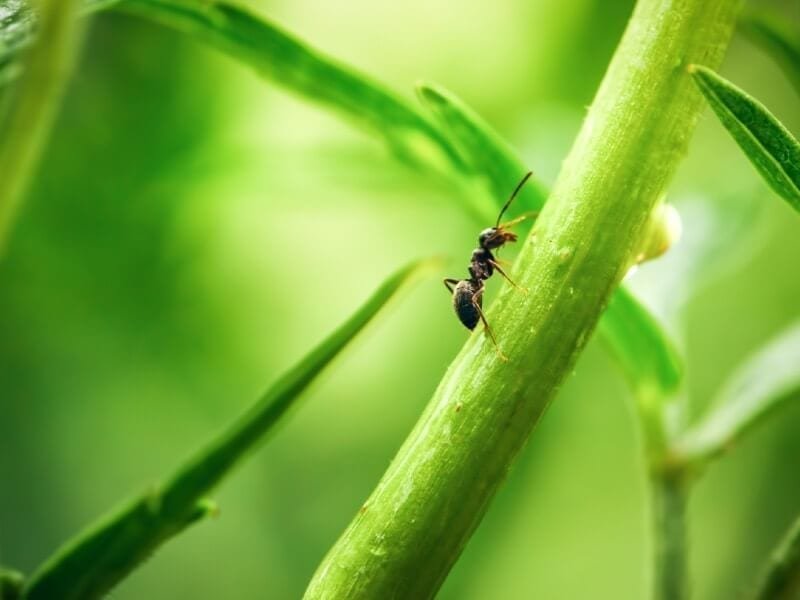
Potential damages to your plants
Aphids aren’t one of the most feared insects by gardeners for nothing, which shows their severity if left untreated. The worst damage they can do is spread viruses to your healthy plants, this can happen in a matter of seconds when colonies become too populated, so make sure you get on top of killing the aphids before they spread.
As these sap-sucking pests remove the phloem sap, this, in turn, weakens the plant, causing a metabolic imbalance and leaves twisting, wilting, and the loss of leaves in extreme cases. The honeydew that aphids leave on the plants if left on the infested plant can sometimes lead to your plant developing fungal growth.
This is called sooty growth which causes leaves and branches to turn black. If your crops become affected by aphids, you may notice the fruit or vegetables become distorted or deformed – essentially ruining your crop.
Ant facts
Now as much as we hate an ant infestation, we can’t be fascinated by these insects! Their life cycle, colony, set up, and how interesting such a tiny body can be – we’ve added some of our favourite facts, which we hope you find as interesting like us!
- A single ant can lift 20 times its body weight!
- Ants live in colonies; there are three different kinds of ants: the queen the female workers and the males.
- The queen and the males are the only ones with wings whilst the workers do not.
- The male-only job is to mate with the future queen and only the queen can lay eggs.
- Depending on the colony there may be one queen or for some many.
- Once the queen of a colony dies the colony will only survive for a few months.
- The queens are rarely replaced and the workers are not able to reproduce.
- Although they can’t technically hear as they do not have ears they use the vibrations through the ground to ‘hear’ instead!
- They also do not have any lungs! Oxygen enters through their tiny holes over their body and carbon dioxide leaves through these same holes!
- In Germany and some other countries wood ants are protected by law due to their importance in destroying forest pests.
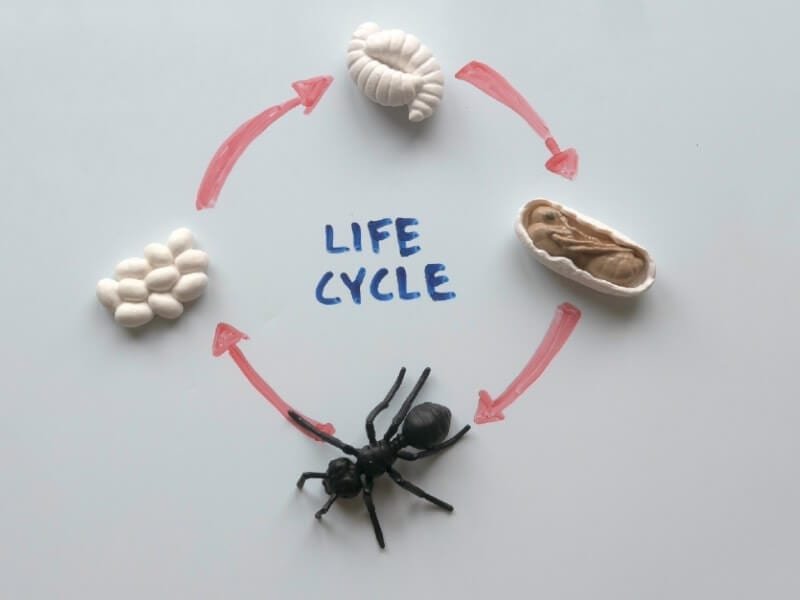
What plants are affected?
Commonly they will be found on lawns, flower pots, compost bins and among the roots of plants; they aren’t too picky on where they nest.


